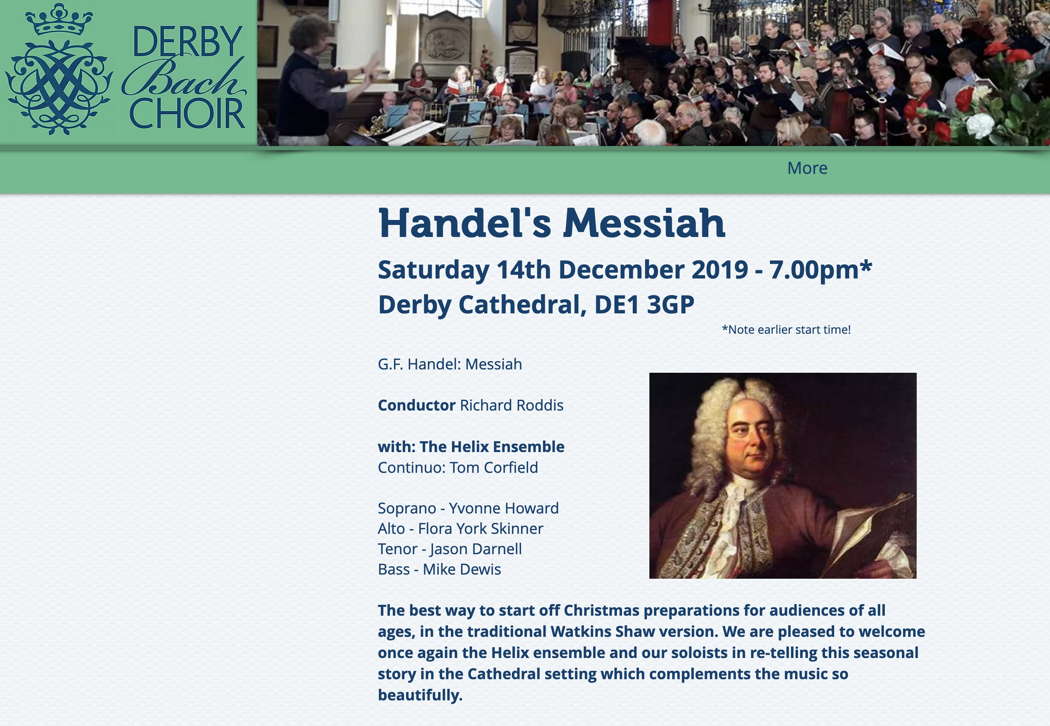 VIDEO PODCAST: James Ross and Eric Fraad discuss Streaming, Downloads and CDs with Maria Nockin, Mary Mogil, David Arditti, Gerald Fenech, John Daleiden, John Dante Prevedini, Lucas Ball and Stephen Francis Vasta.
VIDEO PODCAST: James Ross and Eric Fraad discuss Streaming, Downloads and CDs with Maria Nockin, Mary Mogil, David Arditti, Gerald Fenech, John Daleiden, John Dante Prevedini, Lucas Ball and Stephen Francis Vasta.
 SPONSORED: Ensemble. Melting Rhapsody - Malcolm Miller enjoys Jack Liebeck and Danny Driver's 'Hebrew Melody' recital, plus a recital by David Aaron Carpenter.
SPONSORED: Ensemble. Melting Rhapsody - Malcolm Miller enjoys Jack Liebeck and Danny Driver's 'Hebrew Melody' recital, plus a recital by David Aaron Carpenter.
All sponsored features >>
- Kenneth Alwyn Wetherell
- Isolde
- Chacona
- Philharmonia Orchestra
- Barbara Owen
- Michael Oliver
- Henze: Lucy Escott Variations
- Bob Garner
'Messiah' Overload?
Handel from Derby Bach Choir,
reviewed by MIKE WHEELER
Cutting through the mists of over-familiarity surrounding Handel's Messiah can be a challenge (as can finding a novel opening line for a review of a performance), but Derby Bach Choir and conductor Richard Roddis showed not only that it can be done, but also how to do it – Derby Cathedral, Derby, UK, 14 December 2019.
The choir was on top form, rising to some brisk but not rushed tempi, giving a bold account of 'And he shall purify', throwing out vigorous, assertive cries of 'wonderful, counsellor' in 'For unto us a child is born', and bringing a snappy feeling of bounce to 'His yoke is easy', usually a tricky number to pull off. 'Behold the Lamb of God' was kept on the move, and there was an aptly incisive, jagged quality in 'Surely he hath borne our griefs'. In 'All we like sheep', stabbing accents on each syllable of 'his own way' were possibly an interpretative gloss too far, but fortunately there was no melodramatically undue emphasis on 'world' in 'Their sound is gone out' or on 'death' in 'Since by man'.
After such invigoratingly spirited accounts of the quicker numbers, though, the final chorus left a strange impression. The tempo throttled back noticeably at 'Blessing and honour', and the concluding 'Amen' had so much gravitas that it seemed to belong to a different performance altogether.
Soprano soloist Yvonne Howard had a pleasingly unaffected way with Handel's arching phrases, heard at its best in an intimate account of 'He shall feed his flock'. Flora York Skinner was the engaging alto, producing a nicely ornamented repeat of 'But who may abide', a winningly confiding manner in 'Behold a virgin shall conceive', and plenty of dancing joy in 'O thou that tellest'. But even these were capped by the most deeply-felt account of 'He was despised' I've heard for a long time, achieved with no hint of over-emoting.
Tenor Jason Darnell started well, with warm tone and fine control of dynamics, but mannerisms soon began to creep in, and his declamation verged on the hectoring at times. Words were occasionally lost, and his tight vibrato could be a little distracting. An over-wrought 'Thy rebuke' verged on the expressionist, but a pacy reading of 'But thou didst not leave his soul in hell' was just right.
Michael Dewis, bass, also made a confident start, but an over-emphatic tone crept in here, too, and his delivery in 'Thus saith the Lord' felt more suited to the role of Polyphemus in Acis and Galatea. He was at his best when singing quietly and less self-consciously, as in 'The people that walked in darkness', and 'Behold, I tell you a mystery'.
The opening Sinfony served notice of clean orchestral playing, both sparkling and sensitive, from the Helix Ensemble, and 'Pifa' (the so-called 'Pastoral Symphony') had a delightful lilt to it. Placing the trumpets in the gallery for 'Glory to God' was a nicely theatrical touch. An uncertain beginning to 'Why do the nations', and a re-start in 'Thou shalt break them', were merely passing blemishes.

Online publicity for Derby Bach Choir's 'Messiah' on 14 December 2019
For anyone who, like me, feels wary of Messiah overload, this was just the kind of performance to refresh their appreciation of the piece.
Copyright © 25 December 2019
Mike Wheeler,
Derby UK



